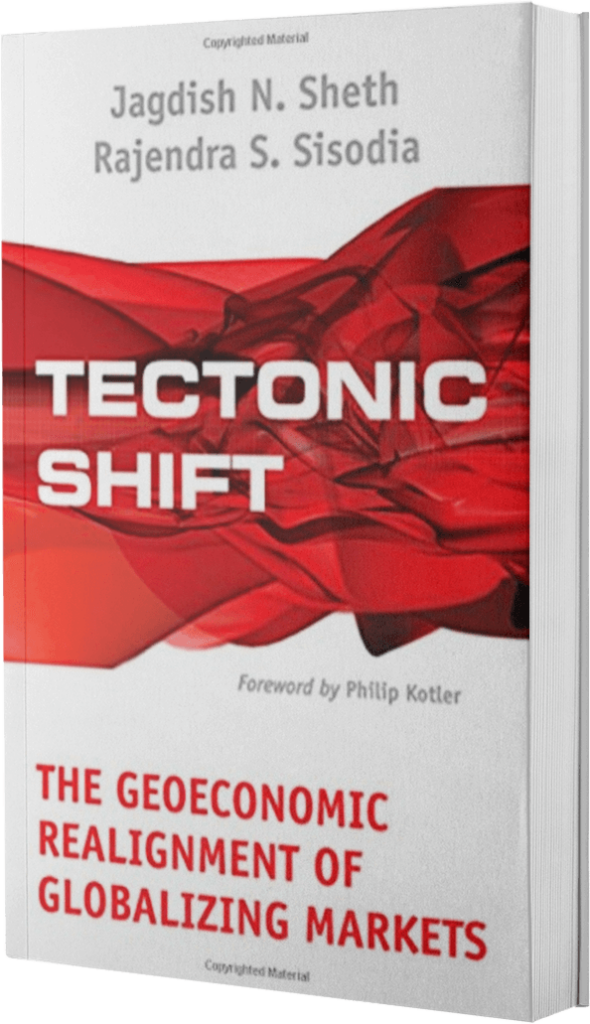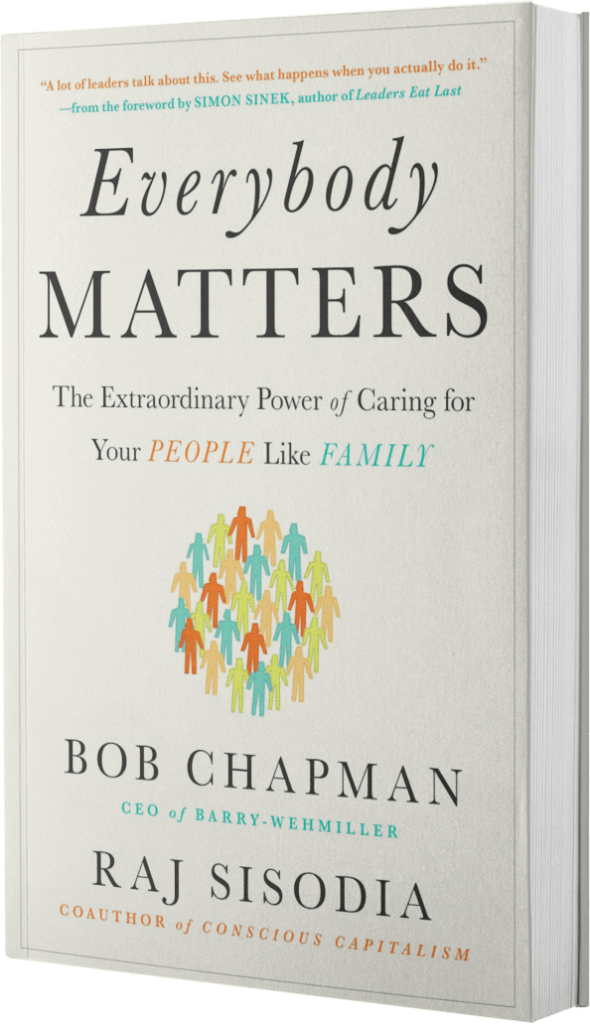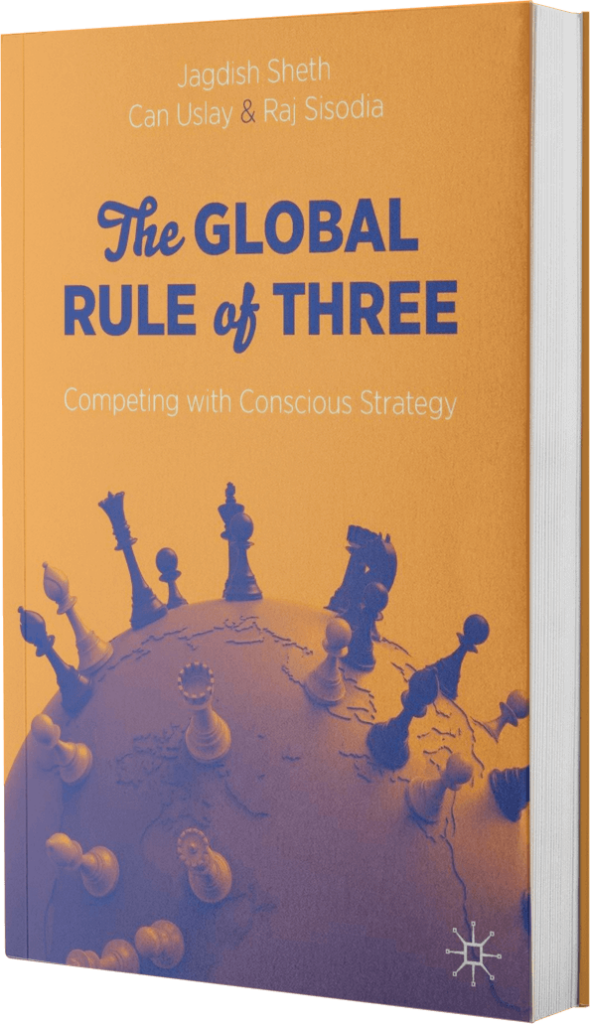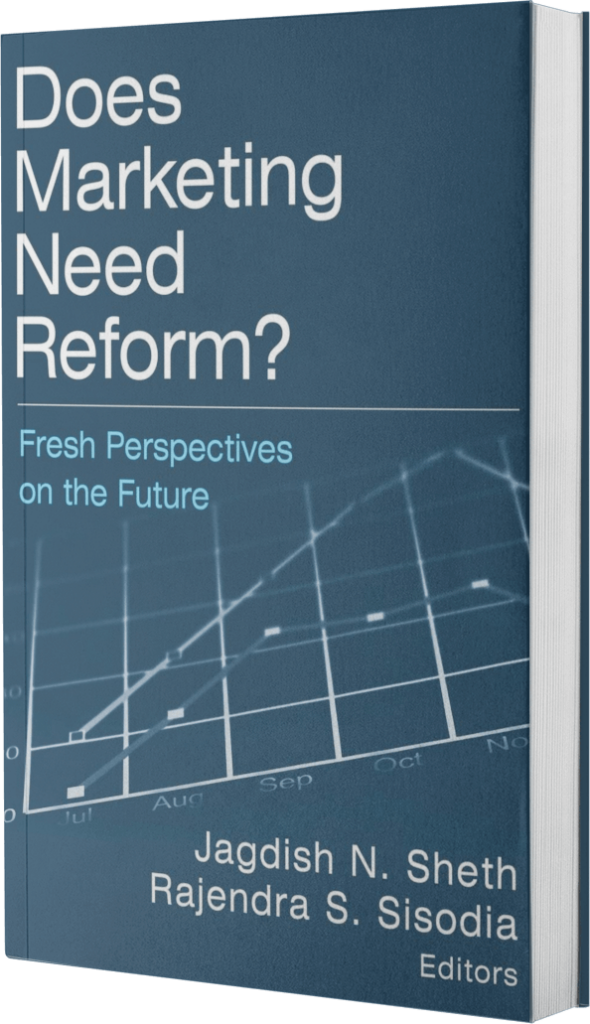Books
Pioneering author.
Celebrated thought leader.
Awakening leaders and liberating the healing, caring spirit of business.
Raj’s book Conscious Capitalism: Liberating the Heroic Spirit of Business (with John P. Mackey, Co-Founder and former CEO of Whole Foods Market), published by Harvard Business Review Press in 2013, was the recipient of a Silver Medal from Axiom Business Book Awards. It was a New York Times bestseller and rose to #2 on the Wall Street Journal bestseller list. His book Firms of Endearment: How World Class Companies Profit from Passion and Purpose was named one of the ten best business books of 2007 by Amazon.com. His first book The Rule of Three: How Competition Shapes Markets was a finalist for the 2004 Best Marketing Book Award from the American Marketing Association. His book Everybody Matters (with Bob Chapman) was a Wall Street Journal bestseller. It was named “Best Leadership and Management Book of 2015” by 800-CEO-READ and one of the best business books of 2015 by Forbes.com.
Raj’s most recent books are Conscious Capitalism Field Guide: Tools for Transforming Your Organization (2018); The Healing Organization: Awakening the Conscience of Business to Help Save the World (2019); The Global Rule of Three: Competing Through Conscious Strategy (2020) (finalist for the 2022 Leonard L. Berry Marketing Book Award); and Awaken: The Path to Purpose, Inner Peace & Healing (2023). Other books include Tectonic Shift: The Geoeconomic Realignment of Globalizing Markets (2006) and The 4A’s of Marketing: Creating Value for Customers, Companies and Society (2012). Raj has also edited three volumes: Does Marketing Need Reform? (2006); Managerial Marketing: Current Thought (2009); and Handbook of Marketing Advances in an Era of Disruptions (2019).
Books by Raj

Awaken
by Raj Sisodia
Awaken delivers a contemporary and accessible guide to how each of us can experience a life of meaning, purpose, and fulfillment in a world that is rife with anxiety, depression, and addiction. Drawing on the distinguished author’s lifetime of accumulated insights and experience, Awaken guides readers on a journey to achieve complete alignment between who they are, what they say, what they do, and how they relate to others.
People are traumatized and polarized the world over. By healing our traumas, uniting the polarities in our lives, and connecting to our deepest purpose, we can attain personal power and amplify our positive impact on the world. Most people have chosen not to deal with their trauma; they conceal it, numb it, and relive it. Through the prism of the author’s life journey, Awaken shows us how to mine the ups and downs of our lives to experience “post-traumatic growth.”
Written for anyone with even a passing interest in improving their inner life and making a difference in the world, Awaken provides proven tools and practical advice that allow readers to know themselves, love themselves, be themselves, and express themselves. Readers will learn how to grow their personal power by building self-trust, cultivating presence, drawing healthy boundaries, leaning into necessary conflict, and challenging orthodoxies. Awaken will help readers see their lives differently in order to transform their experience of living.
Conscious Capitalism
by John Mackey and Raj Sisodia
Conscious Capitalism is for anyone seeking to build a more cooperative, sustainable, humane, and positive future. Spurred on by the publication of this landmark book, Conscious Capitalism is now a global movement to transform the teaching and practice of business around the world.
At once a bold defense and reimagining of capitalism and a blueprint for a new system for doing business, Conscious Capitalism is for anyone hoping to build a more cooperative, humane, and positive future.
Whole Foods Market cofounder John Mackey and professor and Conscious Capitalism, Inc. cofounder Raj Sisodia argue that both business and capitalism are inherently good, and they use some of today’s best-known and most successful companies to illustrate their point. From Southwest Airlines, UPS, and Tata to Costco, Panera, Google, the Container Store, and Amazon, today’s organizations are creating value for all stakeholders—including customers, employees, suppliers, investors, society, and the environment.
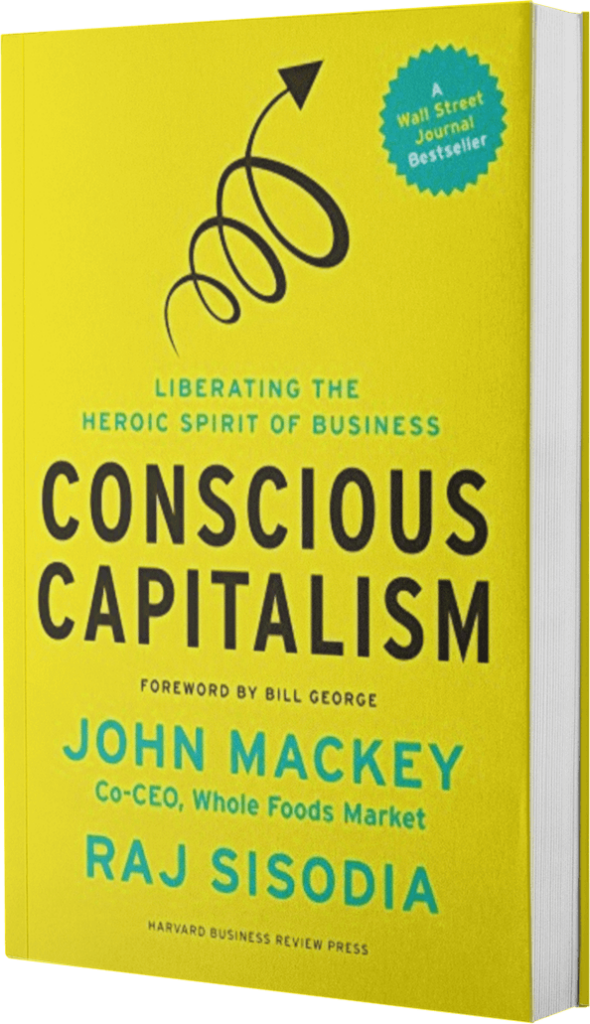

Firms of Endearment
by Raj Sisodia, David Wolfe and Jagdish Sheth
Today’s greatest companies are fueled by passion and purpose, not cash. They earn large profits by helping all their stakeholders thrive: customers, investors, employees, partners, communities, and society. These rare, authentic firms of endearment act in powerfully positive ways that stakeholders recognize, value, admire, and even love. They make the world better by the way they do business-and the world responds. They had created radically new rules. This extensively updated book will help you master those new rules, learn from their newest experiences, build your great firm of endearment, change the world, and succeed on every level that matters.
The Healing Organization
by Raj Sisodia and Michael J. Gelb
Done right, business can alleviate suffering and elevate joy in our lives – while still delivering extraordinary performance.
Employees, customers, investors – all want to do business with companies that have a positive impact on people, communities, and the environment. Even so, many in the business world remain skeptical of the idea that focusing on human flourishing makes you more profitable. And those who have believed in this notion are increasingly frustrated that businesses are losing an opportunity to influence the world in a positive way when they focus solely on making profits.
Raj Sisodia and Michael J. Gelb were inspired to write The Healing Organization because of the epidemic of unnecessary suffering connected with business. Through case studies of such companies as H.E.B., Barry-Wehmiller, DTE Energy, Greyston Bakery, FIFCO, Jaipur Rugs, Jabian Consulting, KIND, Menlo Innovations, Union Square Hospitality Group, Hyatt, Eileen Fisher and others, the book shows how companies that have gone to great lengths to help their employees, customers, communities and society have also reaped both financial and societal rewards.
The Healing Organization advocates for the idea that done right, business can alleviate suffering and elevate joy in our lives – while still delivering extraordinary performance.
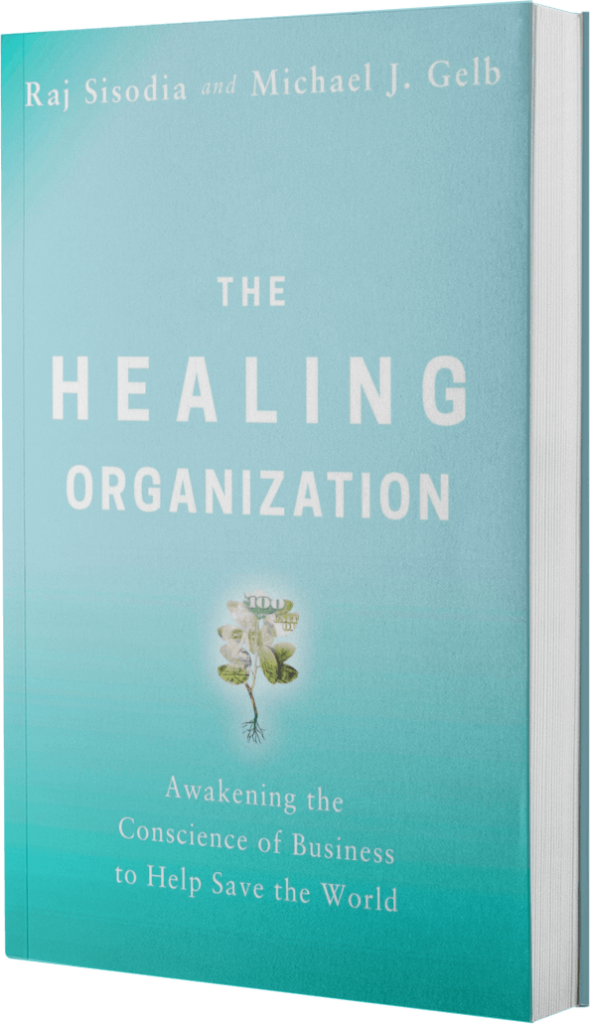
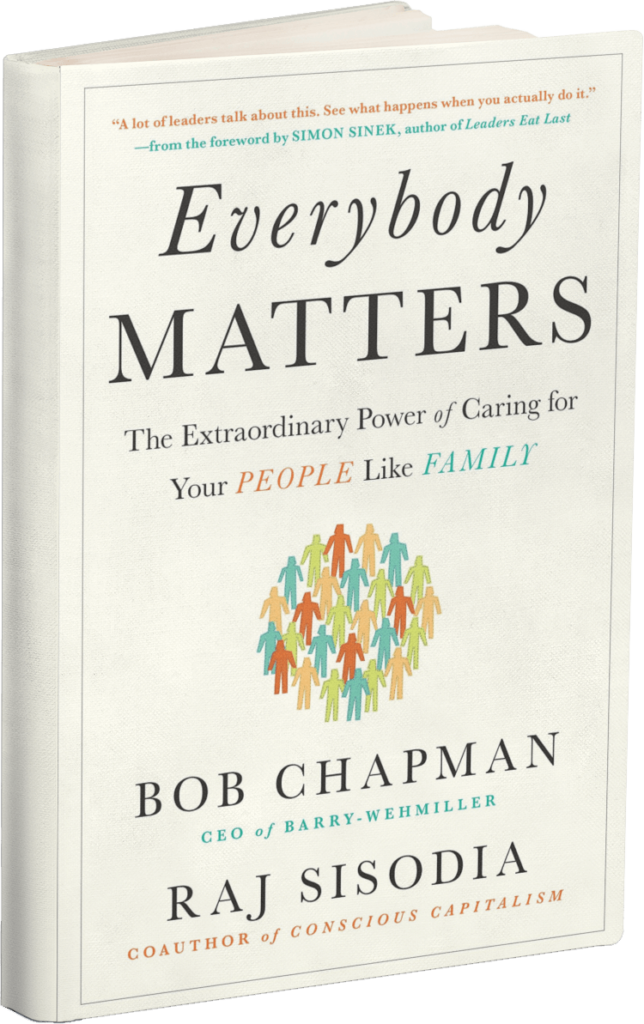
Everybody Matters
by Bob Chapman and Raj Sisodia
Everyone wants to do better. Trust them. Leaders are everywhere. Find them. People achieve good things, big and small, everyday. Celebrate them. Some people wish things were different. Listen to them. Everybody matters. Show them.
“Bob Chapman, CEO of the $1.7 billion manufacturing company Barry-Wehmiller, is on a mission to change the way businesses treat their employees.”
Starting in 1997, Bob Chapman and Barry-Wehmiller have pioneered a dramatically different approach to leadership that creates off-the-charts morale, loyalty, creativity, and business performance. The company utterly rejects the idea that employees are simply functions, to be moved around, “managed” with carrots and sticks, or discarded at will. Instead, Barry-Wehmiller manifests the reality that every single person matters, just like in a family. That’s not a cliche on a mission statement; it’s the bedrock of the company’s success.
During tough times a family pulls together, makes sacrifices together, and endures short-term pain together. If a parent loses his or her job, a family doesn’t lay off one of the kids. That’s the approach Barry-Wehmiller took when the Great Recession caused revenue to plunge for more than a year. Instead of mass layoffs, they found creative and caring ways to cut costs, such as asking team members to take a month of unpaid leave. Asa result, Barry-Wehmiller emerged from the downturn with higher employee morale than ever before.
Shakti Leadership
by Nilima Bhat and Raj Sisodia
Transformative yet simple, Shakti Leadership maps out a new definition of leadership that elevates qualities and abilities traditionally considered feminine — with benefits for both women and men alike.
Too many people, men and women alike, have bought into a notion of leadership that exclusively emphasizes traditionally “masculine” qualities: hierarchical, militaristic, win-at-all-costs. The result has been corruption, environmental degradation, social breakdown, stress, depression, and a host of other serious problems. Nilima Bhat and Raj Sisodia show us a more balanced way, an archetype of leadership that is generative, cooperative, creative, inclusive, and empathetic. While these are traditionally regarded as “feminine” qualities, we all have them. In the Indian yogic tradition they’re symbolized by Shakti, the source that powers all life.
Through exercises and inspirational examples, Bhat and Sisodia show how to access this infinite energy and lead with your whole self. Male or female, leaders who understand and practice Shakti Leadership act from a consciousness of life-giving caring, creativity, and sustainability to achieve self-mastery internally and be of selfless service to the world.
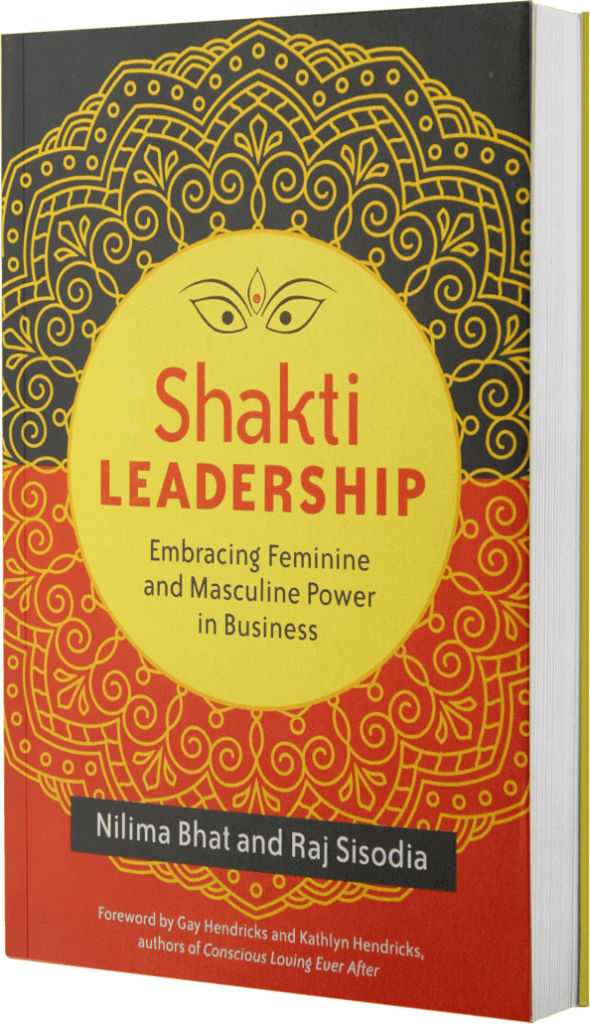
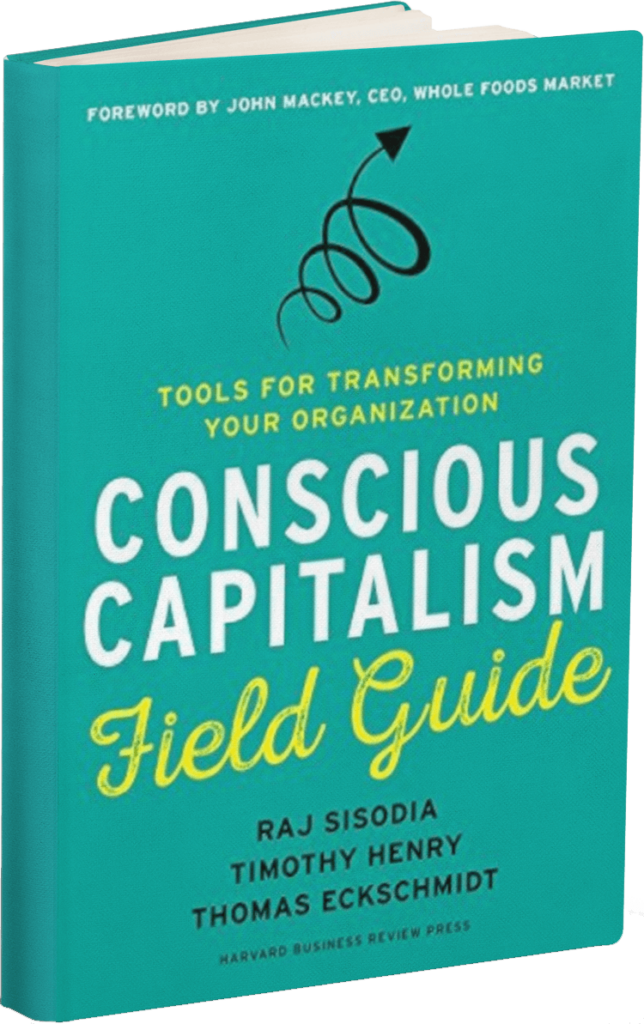
Conscious Capitalism Field Guide
Tools for Transforming Your Organization
You subscribe to the basic idea that business can do more than make money, but you’re not sure how to act on that conviction or how to share it with the rest of your organization. The Conscious Capitalism Field Guide–the authoritative follow-up to the bestselling book Conscious Capitalism, by John Mackey, CEO of Whole Foods Market, and leadership expert Raj Sisodia–gives you the tools for sharing and implementing the principles of higher purpose and conscious business throughout your organization.
This practical guide provides hands-on materials–the same tools used in companies such as Whole Foods Market, Southwest Airlines, Life is Good, The Container Store, Barry-Wehmiller, Zappos, and many others–that you can use on your own, with your team, or with others throughout your organization to build conscious leadership and practices into your business. Organized according to the four core principles (higher purpose, stakeholder orientation, conscious leadership, and conscious culture) of Conscious Capitalism, the book provides exercises, worksheets, checklists, and instructions–for use both individually and with teams–as well as advice, examples, and real-life stories to help you apply these ideas and make them come alive in your organization.
The Rule of Three
by Jagdish N. Sheth and Raj Sisodia
Based on extensive studies of market forces, the distinguished business school strategists and corporate advisers Jagdish Sheth and Rajendra Sisodia show that natural competitive forces shape the vast majority of companies under “the rule of three.” This stunning new concept has powerful strategic implications for businesses large and small alike.
Drawing on years of research covering hundreds of industries both local and global, The Rule of Three documents the evolution of markets into two complementary sectors — generalists, which cater to a large, mainstream group of customers; and specialists, which satisfy the needs of customers at both the high and low ends of the market. Any company caught in the middle (“the ditch”) is likely to be swallowed up or destroyed. Sheth and Sisodia show how most markets resemble a shopping mall with specialty shops anchored by large stores. Drawing wisdom from these markets, The Rule of Three offers counterintuitive insights, with suggested strategies for the “Big 3” players, as well as for mid-sized companies that may want to mount a challenge and for specialists striving to flourish in the shadow of industry giants. The book explains how to recognize signs of market disruptions that can result in serious reversals and upheavals for companies caught unprepared. Such disruptions include new technologies, regulatory shifts, innovations in distribution and packaging, demographic and cultural shifts, and venture capital as well as other forms of investor funding.
Years in the making and sweeping in scope, The Rule of Three provides authoritative, research-based insights into market dynamics that no business manager should be without.
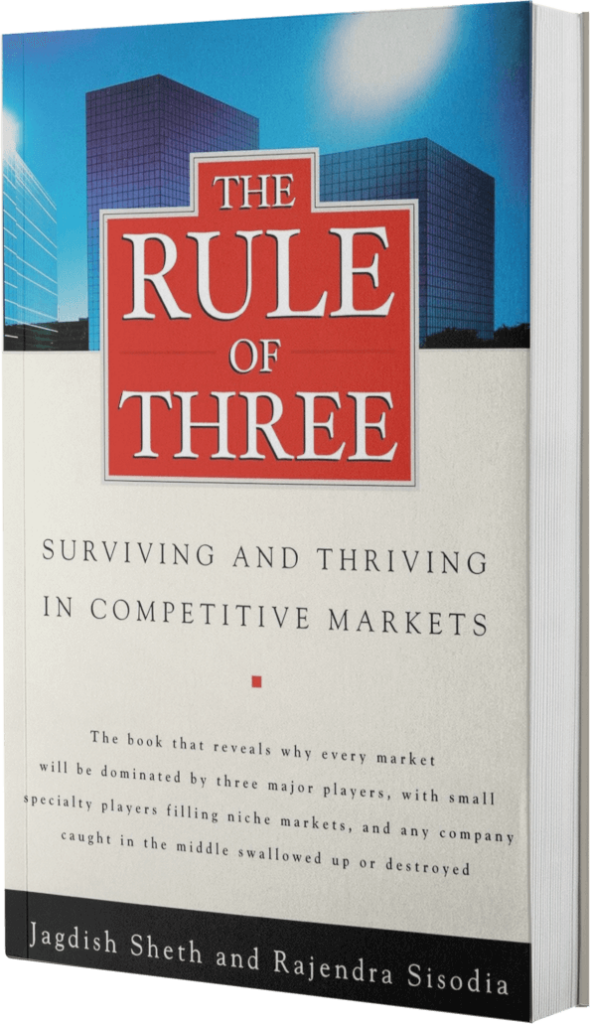
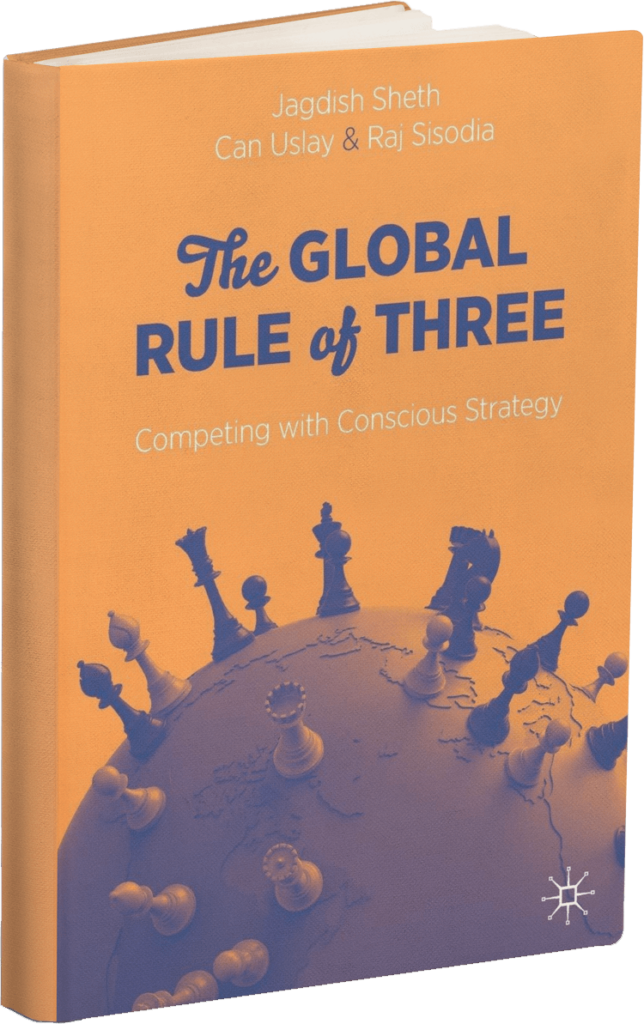
The Global Rule of Three
by Jagdish N. Sheth, Can Uslay and Raj Sisodia
In our increasingly digital, mobile, and global world, the existing theories of business and economics have lost much of their appeal with the phenomenal rise of Chindia, the reality of Brexit, the turmoil caused by the Covid-19 pandemic, and the seismic shifting of the global center of gravity from west to east. In the area of innovation, the traditional thinking that a developed country, often the US, will come up with the next major innovation, launch at home first, and then take it to other markets does not ring true anymore. Similarly, the world where conglomerates go bargain-hunting for acquisitions in emerging markets has been turned upside-down.
This book reveals and illustrates the Global Rule of Three phenomenon, which stipulates that in competitive markets only three companies (which the authors call “generalists”) can dominate the market. All other players in the market are specialists. Further, whereas the financial performance of generalists improves as market share increases, specialist companies see a decrease in financial performance as their market share increases, as the latter are margin-driven companies. This theory powerfully captures the evolution of global markets and what executives must do to succeed. It is based on empirical analyses of hundreds of markets and industries in the US and globally. Competitive markets evolve in a predictable fashion across industries and geographies, where every industry goes through a similar lifecycle from beginning to end (or revitalization). From local to regional to national markets, the last stop in the evolution of markets is going global. The pattern is so consistent that it represents a distinct and natural market structure at every level. The authors offer strategies that generalists and specialist should follow to stay competitive as well as twelve expansion strategies for global companies from emerging markets.
The 4 A's of Marketing
by Jagdish N. Sheth and Raj Sisodia
4 A’s of Marketing is a powerful and tested approach that helps managers see a business’s every action through the eyes of its customers. Throughout this book, the authors demonstrate how looking at the world through the 4A lens helps companies avoid marketing myopia (an excessive focus on the product) as well as managerial myopia (an excessive focus on process).
The authors present a powerful and tested approach that helps managers see a business’s every action through the eyes of its customers. This approach is organized around the values that matter most to customers: Acceptability, Affordability, Accessibility and Awareness. Taken together, these attributes are called the “4A’s.” The 4A framework derives from a customer-value perspective based on the four distinct roles that customers play in the market: seekers, selectors, payers and users. For a marketing campaign to succeed, it must achieve high marks on all four A’s, using a blend of marketing and non-marketing resources.
The 4A framework helps companies create value for customers by identifying exactly what they want and need, as well as by uncovering new wants and needs. (For example, none of us knew we “needed” an iPad until Apple created it.) That means not only ensuring that customers are aware of the product, but also ensuring that the product is affordable, accessible and acceptable to them.
Throughout this book, the authors demonstrate how looking at the world through the 4A lens helps companies avoid marketing myopia (an excessive focus on the product) as well as managerial myopia (an excessive focus on process). In fact, it is a powerful way to operationalize the marketing concept; it enables managers to look at the world through the customer’s eyes. This ability has become an absolute necessity for success in today’s hyper-competitive marketplace.

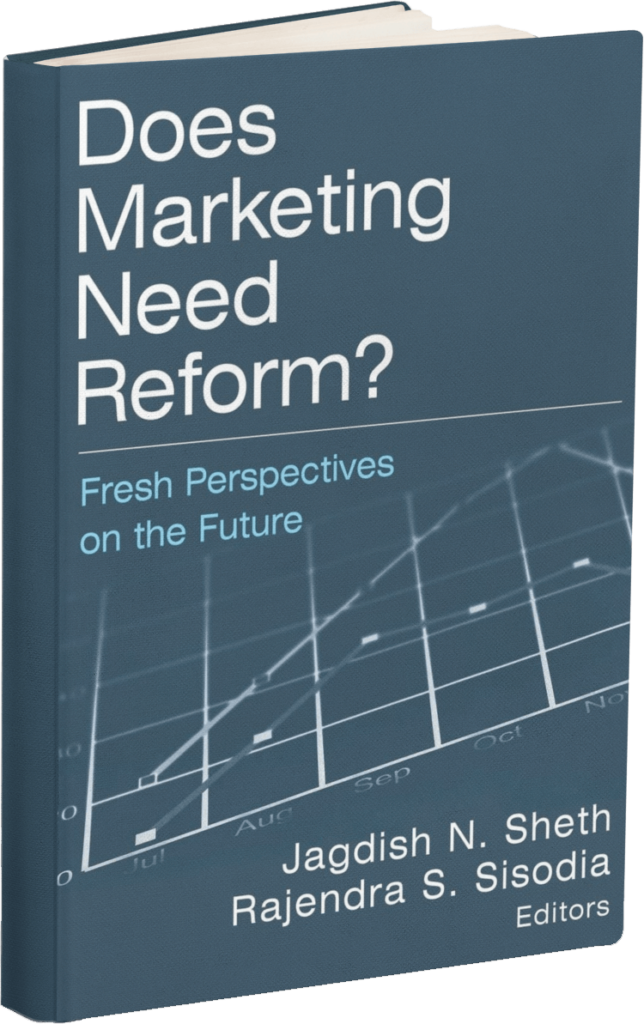
Does Marketing Need Reform?
by Jagdish N.Sheth and Raj Sisodia
Does Marketing Need Reform’ sets the agenda for a new generation of marketing principles in the present date. The book inspires a renewed commitment to the highest ideals of marketing – serving customers individually and society as a whole by synergistically aligning company, customer, and social interests.
Many marketers fear that the field’s time-worn principles are losing touch with today’s realities. “Does Marketing Need Reform?” collects the insights of a select group of leading marketing thinkers and practitioners who are committed to restoring marketing’s timeless values. The book sets the agenda for a new generation of marketing principles. As the editors note in their introduction; “Marketing is a powerful force backed up by huge resources. It must be entrusted only to those with the wisdom to use it well.” The contributors seek to understand and explain how and why marketing has veered significantly off course in order to steer it back in the right direction. The concepts and perspectives presented in this book will inspire a renewed commitment to the highest ideals of marketing – serving customers individually and society as a whole by synergistically aligning company, customer, and social interests.
Tectonic Shift
by Jagdish N. Sheth and Raj Sisodia
While the world is still coming to grips with the implications of globalization, Tectonic Shift: The Geoeconomic Realignment of Globalizing Markets investigates what the globe’s economic and geopolitical future looks like. Read this book to know how the world is evolving into three huge economic and political unions, which will become a reality by 2020.
While the world is still coming to grips with the implications of globalization, Tectonic Shift: The Geoeconomic Realignment of Globalizing Markets investigates what the globe’s economic and geopolitical future looks like and discovers the unfolding of an unprecedented realignment of forces. Based on extensive study and analysis, the authors of this compelling book argue that regionalization will replace the much celebrated globalization, characterized by extensive North-South integration between developed and developing nations. Authors Jagdish N. Sheth and Rajendra S. Sisodia describe how the world is evolving into three huge economic and political unions, which will take shape by 2020, and make various Predictions.
